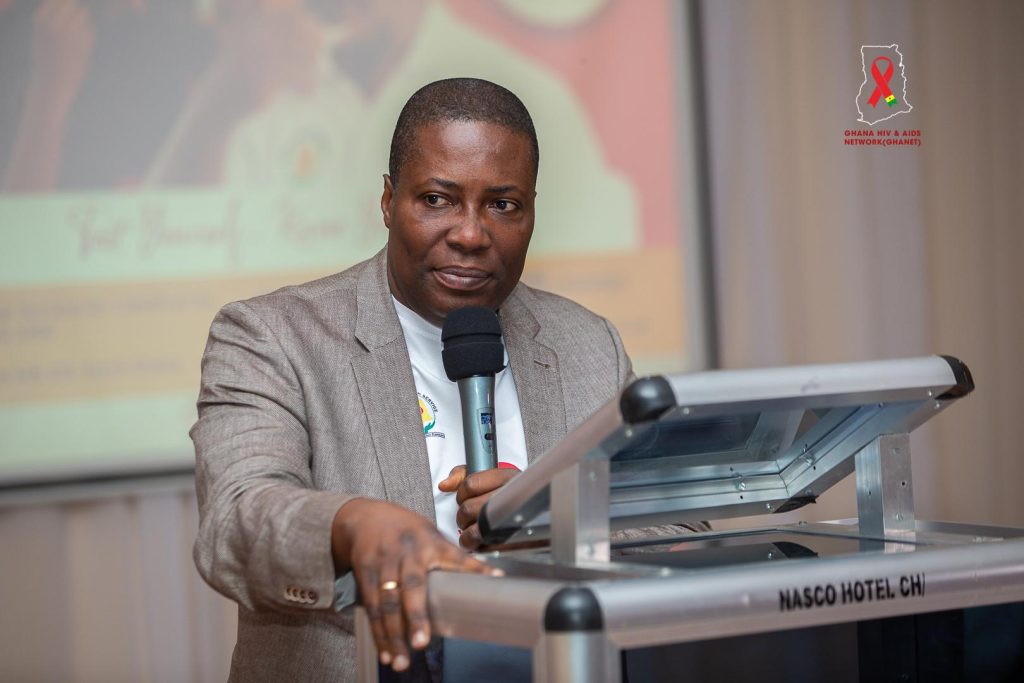By Benjamin Commey
Accra, Sept 03, GNA – Dr Stephen Ayisi Addo, Programme Manager, National AIDS/STI Control Programme (NACP), has urged stakeholders to increase efforts to ensure that Ghana meets the 95-95-95 UNAIDS global targets.
The 95-95-95 UNAIDS global target requires nations to ensure that 95 per cent of people living with HIV are diagnosed, 95 per cent of those diagnosed with HIV are receiving antiretroviral therapy (ART), and 95 per cent of all those receiving ART achieve viral suppression (VLS) by 2025.
Speaking at a three-day workshop in Koforidua, Eastern Region, organized by the GHANA HIV and AIDS Network (GHANET) to launch the Global Fund Grant Cycle (GC7) HIV Self-Testing (HIVST) project, Dr. Addo warned that if immediate action was not taken, the country would fail to meet the target.
He said the country was “currently not making much progress,” as only 65 per cent of the estimated 334,000 people living with HIV were aware of their statuses.
“Of the number that know their status, only 69 per cent has been put on treatment and of those on treatment about 89 per cent have achieved viral suppression,” he indicated.

Dr. Addo emphasized that more commitment was required to ensure that the country met the set target.
He commended GHANET for its successful pilot phase of last year’s HIVST initiative.
“The continuation of the project by GHANET was based on the Network’s innovative approach to the rollout last year. GHANET has succeeded in promoting HIVST as a very important alternative method,” he added.
Dr. Addo also lauded the impact of ART on virus eradication, stating that it had saved thousands of lives and praising Civil Society Organizations (CSOs) such as GHANET for their contributions to reducing new infections.
The workshop was attended by 50 non-governmental organizations (NGOs) selected from the Network’s membership around the country.
Mr. Ernest Amoabeng Ortsin, President of the GHANET, said that as part of the implementation strategy, emphasis would be focused on getting more men to test for HIV through self-testing.
According to him, even though national data showed that more females were infected with the virus than males, when groups of males and females were randomly tested, the male population consistently surpassed the female population.
“This means that if more effort is directed towards getting men to test, it would be possible for the country to find more of the missing HIV cases,” he said.
Mr. Orstin, who also serves as the Acting Chairman of the Global Fund’s Country Coordinating Mechanism, asked the participating NGOs to view themselves as ambassadors on a mission to support the country’s efforts to find the “missing HIV cases” in the country.
In a speech given on his behalf, Dr. Winfred Ofosu, Eastern Regional Director of the Ghana Health Service, urged the participants to take the training seriously and to take steps to enhance demand for HIV testing in the communities where they would be working.
He also emphasized the need for government and CSOs to deepen their relationship, saying that “CSOs and government are partners and must always work together for the greater good of society.”
Some of the topics that were covered included basic facts about HIV and AIDS, prevention of sexual exploitation, abuse and harassment, community demand generation for HIVST, as well as narrative report writing and basic project accounting.

The Ministry of Health and Ghana Health Service (MOH/ GHS) with support from the Global Fund introduced HIV self-testing (HIVST) in the country in 2023.
Under the aegis of the National AIDS/STI Control Programme (NACP), the Ghana HIV and AIDS Network (GHANET) and its Community-Based Organizations (CBOs) undertook community demand generation and distribution of HIV self-testing (HIVST) kits throughout the country.
This year, the project is being scaled up to boost HIV Testing Services (HTS) coverage by improving case findings and locating hard-to-reach populations who may otherwise not be reached by traditional approaches to HIV testing services.
The benefits of HIVST include privacy, confidentiality, convenience, and quicker results.
GNA